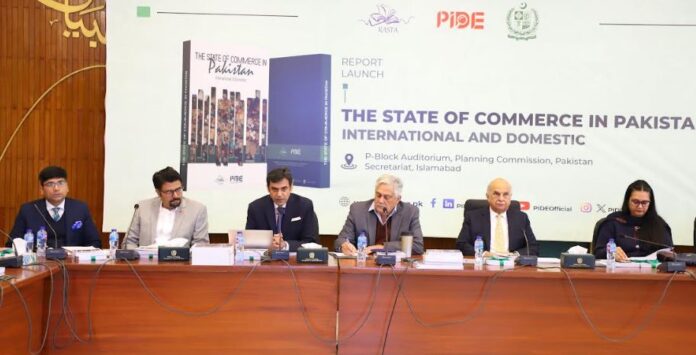ISLAMABAD: /DNA/ – The Pakistan Institute of Development Economics (PIDE) launched its latest research report, “The State of Commerce in Pakistan – International and Domestic” at the P-Block Auditorium, Pakistan Secretariat. The report explores the challenges and opportunities shaping the landscape of Pakistan’s commerce sector. It sheds light on the current state of commerce in the country. As a premier institution dedicated to fostering economic development, PIDE’s report serves as an invaluable source of information and statistics on the state of commerce in Pakistan.
In his opening remarks, Dr. Nadeem ul Haque, Vice Chancellor of the Pakistan Institute of PIDE, has developed this report for the Ministry of Commerce & Industries to fill the comprehensive report, and explore into all facets of internal and external trade in Pakistan. The primary objective is to gain a profound understanding of markets, growth and international and domestic trade. He emphasised that despite the sector being vibrant it faces challenges stemming from the various governments’ indifference, regulatory problems, and various other problems.
He highlighted the growth potential of several entities within sectors such as construction, retail, chain stores, food, franchises, and transport. Dr Haque said that PIDE’s research shows that the government’s footprint on the economy is at over 70% of the economy, with heavy-handed government involvement in trade and markets, stifling market development and growth. The cost of regulation, estimated at over 60% of the GDP, particularly affects segments larger than 50% of the GDP, turning regulation agencies into a burgeoning industry in Pakistan. Our current approach is to fragment out the markets and segment ourselves from the global value chain.
PIDE has presented proposals to the government for deregulation, specifically targeting markets such as real estate, and improvements in tax documentation to foster the creation of large multinational businesses. However, the government’s preoccupation with borrowing and reliance on lenders to decide policy remains a significant challenge.
More specifically the report recommends a broader discussion on an immediate cessation of our absolute policies on import substitute and export promotion could be discontinued. Our Commerce and Industry must develop as part of the global value chain.
According to the report, there is a systemic failure to diversify across manufacturing, exports, and domestic markets. Notably, the import substitution policy, exemplified by the Mobile Phone Manufacturing Policy 2020, has fallen short of its targets. Despite the significant contribution of domestic commerce to formal and informal employment and GDP, this sector has been historically overlooked in policymaking, with the first domestic commerce policy formulated only in 2021.
On the international trade front, the report highlights obstacles such as high tariff cascading, minimal progress in moving up the export product value chain, and limited destination diversification. Urban design, zoning regulations, and city planning negatively impact businesses in Pakistan, particularly in domestic commerce. The prevalence of the “Seth” culture, characterized by family-owned businesses dominating the stock market, raises concerns about market efficiency. Furthermore, the challenges faced by the real estate and construction sectors are highlighted, with a dominance of plots and limited commercial real estate negatively impacting domestic commerce.
The chief guest on the occasion was Dr. Mohammad Jehanzeb Khan, Deputy Chairman of the Planning Commission, Government of Pakistan, while Ms Sarah Saeed, Special Secretary of the Ministry of Commerce attended the event as a special guest.
In his address, Dr. Khan underscored the paramount role undertaken by the Pakistan Institute of Development Economics (PIDE). He lauded PIDE for spearheading cutting-edge research crucial for the nation’s immediate requirements. He further said that a fundamental tenet of effective governance is the government’s responsibility to not only generate revenue but also to ensure its judicious utilization through enhanced public expenditure. Emphasizing the need for improvement in public expenditure, we are committed to optimizing the impact of public funds for the betterment of our society and fostering sustained economic advancement.
In her remarks, Ms Sarah Saeed commended PIDE’s efforts in highlighting the importance of domestic commerce in Pakistan. She further stated that the Ministry of Commerce acknowledges the significance of domestic commerce in Pakistan, as rightly emphasized and consistently advocated by PIDE. Consequently, the ministry has established a separate domestic commerce department. While domestic commerce has become a provincial subject after the 18th amendment, coordination and collaboration among the federal and provincial governments are essential to set the direction of policies supporting the external trade sector and domestic commerce.

















